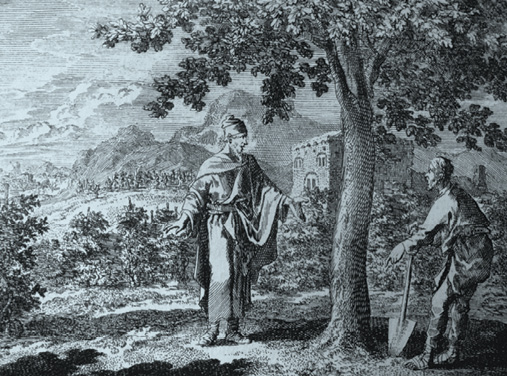Farming isn’t what it used to be. We live in a cash-crop economy, from seed to harvest in just a few months. Our world wants immediate results, as hands-off as possible. But the Scriptures teach that the Lord takes a long-haul approach to cultivating the soul.
Our parable (Luke 13:6-9) presents a fig tree planted as the centerpiece of a vineyard. Figs were the highly prized sugar-crop of the day. Fig trees were time- and resource-intensive, so if one proved barren, it was to be summarily removed.
This landowner has been more than patient: “Look, for three years I have come seeking fruit on this fig tree and find none. Cut it down.” (verse 7)
Yet his groundskeeper advocates an old-time, hands-on approach: “Sir, let it alone this year also, until I dig around it and fertilize it.” (verse 8)
Throughout Biblical imagery, a vineyard is commonly the kingdom of God as a whole, and the fig tree, the chosen nation of Israel. The parable’s context, Jesus confronting the false religion of His day, substantiates that He speaks of the longsuffering patience shown Abraham’s biological descendants throughout their wayward history.
When the landowner’s gardener intercedes for just one more stretch of time—“If it bears fruit, well. But if not, after that you can cut it down” (verse 9)—Jesus uses poetic code to teach us that the reason that the Lord had been so merciful throughout the centuries was for the sake of His labor among lost mankind: “And the Lord, whom you seek, will suddenly come to His temple, even the Messenger of the covenant, in whom you delight. Behold, He is coming.” (Malachi 3:1)
There was no more personal care than the three years the Son of God walked the earth: “The Word became flesh and dwelt among us.” (John 1:14).
Nothing stands between the axe and the tree except this Gardener like no other, Who has reconciled the sinner with our landowner God by having His flesh dug into with nails and spear, and by fertilizing the earth with His holy, precious blood.
Despite this painstaking labor on home soil, the fig tree’s time of grace came to a tragic end. Bearing no fruit, “not one stone was left upon another.” But the long-haul agricultural approach is never a waste. The Lord’s long-standing mercy toward the fig tree Israel is a lesson for every believer to learn from: “Now all these things happened to them as examples.” (1 Corinthians 10:11) “Whatever things were written before were written for our learning, that we through the patience and comfort of the Scriptures might have hope.” (Romans 15:4)
Like a sweet shower of grace, the Gospel has moved from that barren land out across the globe. During this last stretch of time until Christ’s return, the keeper has placed the tools of Law and Gospel (to dig and fertilize) in our feeble care.
The Lord still farms the way He always has. On account of sin, we should have been cut down long ago. Instead, Jesus tenderly digs in with the Law, when needed, and never hesitates to get His hands dirty to show you His love. In contrast to this cash-crop world, faith bears fruit over time in Word and Sacrament, so that you can “walk worthy of the calling with which you were called, with all lowliness and gentleness, with longsuffering, bearing with one another in love.” (Ephesians 4:1-2)
The Gospel never fails to provide a yield, just not quite how you might expect. May you learn from any barren patches of your life to turn again to the Keeper of your soul and find in Him “a God full of compassion, and gracious, longsuffering and abundant in mercy and truth.” (Psalm 86:15)

is pastor of Prince of Peace Lutheran Church in Hecla, South Dakota.

